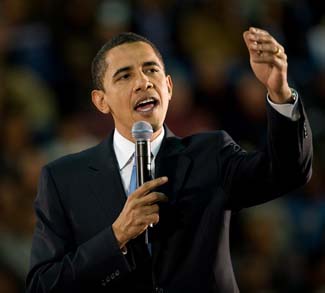Summary
Some US officials are backing away from the idea that the July 2011 deadline set by President Obama will mark a major drawdown of US forces from Afghanistan. But leading Democrats, aware of growing opposition to the war among supporters, are singing a different tune.
Analysis
On Sunday, Defense Secretary Robert Gates became the latest senior administration official to play down the likely size of any drawdown from Afghanistan in July next year.
“My personal opinion is that … draw-downs early on will be of fairly limited numbers. And as we are successful, we’ll probably accelerate. But, again … it will depend on the conditions on the ground,” Gates told ABC TV’s This Week.
Gates joined other senior officials in an apparent effort to reassure US allies in the region – and warn the insurgents in Afghanistan – that the US would not walk away from the conflict next year, despite growing unease, especially among Democrats, about the progress of the war.
David Killcullen, an Australian counter-insurgency expert who has advised top US military officers, has been expressing the concerns of many in the military about the July 2011 deadline. He told CBS last week that, when Obama set the date to begin a US withdrawal and the transition to Afghan control of security, Taliban leaders “immediately went out and spoke to the population and said the Americans are leaving in 18 months.”
To counter such talk, Gates underlined that even once the drawdown gets under way, there will still be sufficient US forces on the ground to hold the line against the Taliban.
“We need to re-emphasize the message that we are not leaving Afghanistan in July of 2011. We are beginning a transition process and a thinning of our ranks […] and the pace will depend on the conditions on the ground,” Gates said. “And if the Taliban are waiting for the nineteenth month, I welcome that, because we will be there in the nineteenth month and we will be there with a lot of troops.”
Eroding support
But in playing down the significance of the July 2011 date, Gates also added fuel to a growing political controversy at home, where news reports have noted that last month was the deadliest ever for US forces in the country – and polls show eroding public support for the war.
“A lot in the military think they outmaneuvered the president to render the July date meaningless,” charged Vice President Joseph Biden last month.
In some ways, he was giving voice to widespread concerns among progressives inside and outside the administration that the president has been boxed in – effectively forced to take ownership of an increasingly unpopular, and increasingly endless-looking, war.
“It could be as few as a couple thousand troops. It could be more,” added Biden of the initial July 2011 drawdown.
“Well, I hope it is more than that,” House Speaker Rep. Nancy Pelosi, Democrat of California,told ABC on Sunday about Biden’s comments. “I know it’s not going to be turn out the lights and let’s all go home on one day. But I do think the American people expect it to be somewhere between that and a – a few thousand troops” leaving in July 2011.
The background to all this is ebbing public support for the war – and the concomitant reluctance of a growing number of Democrats in Congress to keep funding the military effort there, even as they are unable to muster the votes to extend unemployment insurance or pass clean energy legislation.
Last week in the US House of Representatives, 102 Democrats (joined by 12 Republicans) voted against a war funding bill providing nearly $59 billion in emergency supplemental funding for the military in Iraq and Afghanistan – meaning that the bill only passed with Republican support. Last year, on a vote on a similar bill, only 32 Democrats opposed it.
“I believe this war to be a tragic failure that continues to undermine rather than advance our national security interests,” said Rep. Lynn Woolsey, Democrat of California, and a long-time critic of the war. “The American people are running out of patience, and with 114 members of the House voting this week against the war spending supplemental, Congress is beginning to catch up to the public.”
Indeed, a series of polls last month by Harris Interactive, ABC News, and Quinnipiac University all show declining support for, and growing pessimism about the US effort in Afghanistan. The decline is especially marked among Democrats and in some indices has brought support for the war to its lowest ebb since Obama unveiled his new strategy at the end of last year.
End game
By the end of the summer, there will be 100,000 US troops on the ground in Afghanistan. But these poll numbers, and the increasingly divergent messages coming from those Democrats charged with winning the war, versus those charged with winning the elections, illustrate the shrinking window of opportunity those troops have to make a real difference to the Afghan security situation.
Interestingly, theABC poll also shows a large majority – 51 percent to 37 percent – of Americans oppose a negotiated settlement with the Taliban that would allow insurgents to hold government offices if they agreed to stop fighting.
Not only is that out of step with opinion in Afghanistan itself – where two-thirds support such a deal according to an ABC News/BBC/ARD poll in December – but it may also create problems for the US administration down the road, since that is the end game they envisage, as well.
“The way out is to improve the security situation in Afghanistan … and to degrade the Taliban to a degree where they are willing to consider reconciliation on the terms of the Afghan government – detaching themselves from al Qaeda, agreeing [to] abide by the Afghan constitution, agreeing to put down their weapons … Reconciliation … must be the end game here,” Gates said.
Veteran career diplomat and South Asia specialist Teresita Schaffer sums it up like this: “The administration has a political problem. This war is increasingly unpopular,” she told Voice of America. “You’ve got congressional elections coming up in a few months, another presidential election coming up in 2012.
“Obama’s got a problem with the Democrats,” she concluded.



